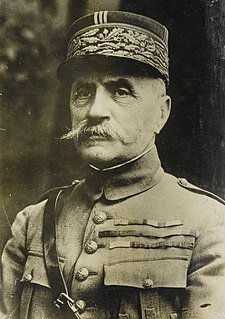Top 38 Quotes & Sayings by Ferdinand Foch
Explore popular quotes and sayings by a French military man Ferdinand Foch.
Last updated on April 14, 2025.
School is a building that has four walls-with tomorrow inside. Our deeds determine us, as much as we determine our deeds. There are many ways of going forward, but there is only one way of standing still. A lot of us would like to move mountains, but few of us are willing to practice on small hills. Doing your best is more important than being the best. Giant oak trees started out as little nuts. The most powerful weapon on earth is the human soul on fire.
All the same, the fundamental truths which govern that art are still unchangeable; just as the principles of mechanics must always govern architecture, whether the building be made of wood, stone, iron or concrete; just as the principles of harmony govern music of whatever kind. It is still necessary, then, to establish the principles of war.
To be disciplined does not mean being silent, abstaining, or doing only what one thinks one may undertake without risk; it is not the art of eluding responsibility; it means acting in compliance with orders received, and therefore finding in one's own mind, by effort and reflection, the possibility to carry out such orders. It also means finding in one's own will the energy to face the risks involved in execution.
Far from being a sum of distinct and partial results, victory is the consequence of efforts, some of which are victorious while others appear to be fruitless, which nevertheless all aim at a common goal, all drive at a common result: namely, at a decision, a conclusion which alone can provide victory.
The distribution of troops devoted to the defence of a place includes a garrison, an occupying force, numerically as weak as possible; a reserve as strong as possible, designed for counterattacking and for providing itself, at the moment it goes into action, with a security service which will guard it from any possible surprise.
This absence of similarity among military questions naturally brings out the inability of memory to solve them; also the sterility of invariable forms, such as figures, geometrical drawings ( épures ), plans ( schémas ), etc. One only right solution imposes itself:;: namely, the application, varying according to circumstances, of fixed principles.





















